- Home
- Michael McDowell
Gilded Needles (Valancourt 20th Century Classics) Page 4
Gilded Needles (Valancourt 20th Century Classics) Read online
Page 4
“I had other reasons for not wanting to open the house,” said Helen timidly. “Reasons . . . of conscience.”
“Conscience?” repeated her aunt dubiously.
“New Year,” said Helen hesitantly, “as you probably know, is essentially a pagan holiday. It’s not part of the Christian calendar, at least not part of the Presbyterian church calendar, and I would have been very uneasy about opening a minister’s house in celebration of a pagan holiday.”
“Helen,” said her aunt, eyes wide in wonder, “don’t you think you ought to let Edward make the decision in such a matter? He’s not only your father, he’s an ordained minister in the Presbyterian church.”
“Yes,” whispered Helen, “I’ve decided that next year, if he wants to open the house, I will be there to receive the guests.”
“Good,” said Marian, “no more of this nonsense then.” She closed her eyes once more. “How many of those cards have you counted?”
“Sixty-three,” said Helen. “But there are a good many more.”
Marian nodded her satisfaction.
It had grown dark in the room as the two women talked, but neither had suggested that the gas be turned up. There was comfort in the quiet and the dimness after so many long hours of strangers and volubility and movement. The muffled rattle of dishes and crystal and plate behind the dining room doors was a low, almost musical accompaniment to their discourse.
In a lengthy silence, while Helen was counting the cards, Marian Phair fell asleep in the corner of the sofa, and her coiffure was crushed against the upholstery.
Chapter 4
Several times in the gathering dusk, while Marian Phair dozed in the corner of the sofa, Helen Stallworth heard the approach on the front steps of gentlemen who dropped their visiting cards into the basket hung upon the street door and then hurried away to make the last of their New Year calls.
At last, however, they were disturbed by a sharp knocking and Marian rose in some confusion. Helen would have liked to get up also, but the visiting cards lay in neat piles in her lap and she could not move without tumbling them all together again. Peter Wish entered the hallway from the dining room and in another moment had admitted those without.
Two men appeared in the parlor door, one of them quite old and looking it; one of them only middle-aged but appearing rather younger. Yet because both possessed the same general cast of features, the same transparent skin, and the same brilliant light-blue eyes, they were obviously father and son. Their cheeks were bright pink from the sharp wind, but that little color faded quickly in the warmth of the parlor and they became white again as hothouse lilies.
Judge James Stallworth was seventy-two. He had always been a large man, but in the past few years, inflicted with an intestinal disorder that had killed his appetite, he had lost much of his bulk. He still carried himself, however, as a much heavier man, and the difference between his carriage and his form made him appear almost gaunt. He wore his hair fairly long, but combed back over his ears; his face was smooth shaven.
Judge Stallworth’s son Edward was a refined, almost delicate, specimen of his father’s type. The ladies of his congregation thought his hands very finely formed and much admired his erect, elegant, easeful posture. His skin, without wrinkle or blemish, made him seem almost ten years younger than his actual age of fifty. His hair was light brown and soft and straight, and though thinning, did not much recede over his forehead, which was high anyway. It was cut short to display the fine shape of his head. His beard was light and wiry, cut into large triangular whiskers that curved around to meet his large straight moustache, leaving his chin and lower jaw denuded of hair.
Father and son both, with their white skin, their shining eyes of the lightest, most liquid blue, their light-colored hair, seemed faded water-color portraits of gentlemen much more robustly tinted. But what made the father seem most like the son—and the son most like the father—was a certain reserved coldness that permeated every word they spoke, that slowed their limbs and made every gesture deliberate and meaningful.
“I hope your speech is not slurred,” said Marian to her father and her brother. Edward Stallworth was actually only Marian’s half brother, for the judge, their father, had been married and widowed twice; there was nearly twenty years difference in the ages of Marian and Edward and they maintained rather a distant familiarity.
“Certainly not,” the judge replied crisply.
“Good,” said Marian, with her eyes closed, “then sit and talk to me. I’ve not heard an intelligible word all afternoon.”
Father and son sat and told how they had come upon one another quite by chance, in a house on Stuyvesant Square.
“I called upon all the elders and deacons and upon all those who had contributed—a certain amount—to the church funds this last year, but I’m afraid there simply wasn’t time to get around to everyone in the congregation,” said Edward. “I fear some one or two will be offended, but that of course need not have been the case, Helen, if you had consented to open the house.”
Helen did not venture to reply to her father’s criticism.
“Did you see Duncan, Father?” asked Marian.
“I have seen Duncan twice since breakfast. He showed me a list of eighty-five houses where he planned to call.”
“Eighty-five!” exclaimed Helen.
“In 1855,” remarked Judge Stallworth, “I made one hundred and seventeen calls. Now it is true that the city was somewhat smaller then, and one hadn’t so far to travel—one needn’t go above Fourteenth Street then for instance—yet I stopped at each of those houses, paid my respects to every lady in sight, consumed a tumbler of punch and ate whatever was nearest me on the table, went home and prepared a speech for the following morning’s session in court. I was the prosecution, and the man was hanged. Though I’m pleased to find Duncan so industrious, I don’t believe he will make even those eighty-five calls. New Year has fallen off of late, fallen off shamefully. I think that Fifth Avenue hardly observes it at all. New money does not observe the New Year. New money evidently has other pleasures. I could almost be surprised if Duncan found eighty-five houses that were receiving today.”
“Perhaps the custom will die out entirely,” said Helen with such eager hopefulness that the others looked at her curiously.
“Helen,” said her grandfather, “if the world were formed according to your taste, it would be but a mousy, gray, pinched place. Doubtless you would eliminate criminals and constabularies, harsh laws and harsher prisons. I for one would have no place in such a world as that.”
Peter Wish came in to raise the gas in the room. When he had retired, Judge Stallworth rose and warmed his cold slender hands at the fire.
“I have had so many disappointments in my life,” said Judge Stallworth, “that I would not be surprised if the custom did die out. It would be but one disappointment more. Twenty years ago, this parlor would have been filled with guests at this time of the afternoon. Even ten years ago. What is the time now?”
“Half past five,” said Marian.
“Services are at half past seven,” said Edward Stallworth. “I hope we are all to be there.”
“Yes, of course,” said Judge Stallworth, “we shall all certainly come. It is the New Year.”
“Duncan promised to return by six o’clock,” said Marian. “I hope that he has not been waylaid or forgot the time. It would be—”
“Did you see Benjamin?” asked Helen Stallworth of her grandfather anxiously.
“No,” the old man replied coldly, “I did not, but it may be that Benjamin and I do not make the same social circuit.”
Benjamin’s father laughed sharply, and Helen Stallworth glanced away in pain, more hurt by her family’s disparagement of her brother than by the sarcasm that had been directed at herself.
At that moment,
the dining room doors were drawn open by Amy Amyst and Peter Wish. The table had been cleared and placed again in the center of the room, with the chairs set around. A cooler with two bottles of champagne was set on the sideboard, with two large plates of cold meat and sweet pastries to the side.
“Papa,” said Marian, “I hope you haven’t had so much to drink today that you can’t take a glass with us to toast the New Year.”
“Marian,” replied her father, “in every house I accepted a glass of whatever was offered to me first: claret or sherry or coffee or mulled wine or champagne, and I held it gratefully in my hands and then I set it aside. I’ve had nothing all day.”
“I hope Duncan can say the same when he arrives.”
“He cannot,” said Judge Stallworth, “I know that.”
There was another knock at the front door. This time Helen, who had placed the visiting cards upon the mantel and announced their number as two hundred and seventeen, ran to the door in hope that it was her brother. In just a moment she returned, saying, “It’s Benjamin and Duncan.”
If Judge Stallworth and his son Edward, when they stood together in the doorway, had borne resemblance to one another amply displaying that they were near kin, then the dissimilarity in appearance of Duncan Phair and Benjamin Stallworth was so pronounced that one could scarcely be brought to believe that they were related at all—even by marriage.
Marian’s husband, Duncan Phair, was a handsome man, a couple of inches under six feet, with a well-formed body; he was pleasantly fleshly, but by no means corpulent. He had a noble square-shaped head, and his dark hair was parted just left of center. His beard was worn much thicker and longer than the hair on the top of his head and a full moustache covered his mouth completely.
In decided, almost ludicrous contrast, his wife’s nephew, Benjamin Stallworth, was neither tall nor particularly well formed. His shoulders sloped markedly into thin rickety arms; his hands were absurdly large and looked like stuffed white gloves tied to the ends of sticks. His head was egg shaped and massive, much larger at the top than at the bottom. His chin and jaw might be called such only because chins and jaws appeared on other men in the place where Benjamin had a single expanse of soft bone and curving flesh. His hair was lank and thin and was combed down over his forehead. His ears were small and lay flat against his head, heightening the overall likeness to a comically painted Easter egg.
Duncan Phair, with smiling playfulness, pushed Benjamin into the room. “I found him wandering up Madison Avenue, having no idea that he was even in New York, stumbling into strange houses and offering proposals of marriage to three hundred-pound widows.”
“No,” stammered Benjamin, “I was not. We ran into one another near Madison Square. We were both on our way here. I’ve had very little today. Champagne gives me a sick headache, and hot wine makes me dizzy.” He sat nervously in a chair that was apart from the others, and turned his face away, complaining of the heat in the room.
“I’m glad you abstained, Benjamin,” said his sister kindly.
After Duncan had briefly described his afternoon and warmed himself by the fire, as host he invited the family into the dining room to toast the New Year with champagne. This was their usual ceremony and without being asked, Helen hurried out to fetch little Edwin and Edith who were to be allowed to press the rim of an empty glass against their lips.
Edwin Phair was four years old and his sister Edith three. They had been allowed in the drawing room for an hour during the time that their mother was receiving. Dressed very much alike in new blue frocks that showed off the piercing blue Stallworth eyes, both had sat primly on an ottoman before the fire, impressed into silence and immobility by their mother’s threats of irrevocable banishment to the nursery if they either spoke or raised a finger out of turn. Edwin, who had a distressing propensity to acrobatics, marvelous in themselves but unbecoming to one who was an heir in the Stallworth family, had been hard put to remain still so long, and once returned to the nursery he had promptly executed half a dozen flips over his sister’s head in relief.
When Helen returned, the two handsome children having rushed in a little ahead of her, all the family was gathered around the table and Duncan Phair was pouring out champagne into a set of eight glasses. Each solemnly took a glass and raised it. The two children raised theirs high, and had they been full, would have spilled out every drop.
“May we prosper in eighty-two,” said Duncan.
“Prosperity,” nodded James Stallworth, “and confusion to the Democrats.” He beckoned to his grandson Edwin, and tousled his thick hair in gruff affection.
“Continued favor in the sight of God,” said Edward Stallworth, with eyes closed briefly.
“May we prove ourselves worthy of the blessings already bestowed upon us,” said Helen.
Benjamin grinned doltishly as he raised his glass higher, but said nothing.
“To the Stallworths,” concluded Marian.
They drank, only Helen not finishing hers. She placed her glass upon the table, leaned down and took those of Edwin and Edith as well. All the others held their glasses out for replenishment.
“Helen,” said Duncan Phair, “please take the children upstairs again. You may wish to stay with them for a while.” His tone of voice made her agree, though with some apprehensive puzzlement, that she might do just that.
Helen gathered the children, speaking to them softly and unintelligibly, and ushered them out of the room. As she cast a troubled backward glance at her brother he turned uneasily away.
For the next few moments Duncan Phair was occupied in pouring out more champagne.
“Benjamin was precise,” he said smiling, as he handed his father-in-law a glass. “I met him at the southwestern corner of Madison Square, just where Broadway crosses Fifth Avenue, is that not correct, Benjamin?” Now that Benjamin’s sister was out of the room, a definite sharpness entered Duncan’s voice.
Benjamin had moved skulking to the doors into the parlor, but he paused now to nod sullenly to Duncan’s question.
“Don’t go away,” said his grandfather, but there was no kindness in his voice. “Drink your champagne with us, Benjamin. You don’t seem to have overdone it today.”
“No,” said Duncan Phair, “he didn’t. How many houses did you visit today, Benjamin?”
“I’m not certain,” stammered Benjamin.
“Three?” said Duncan icily. “As many as five?”
“Five houses!” cried Marian. “Where have you been, Benjamin?”
“Where did you spend the day, Benjamin?” asked his father quietly, noting with distaste the manner in which his son slouched against the papered wall.
“Benjamin, I am sure we are all happy to hear, refused to become inebriated on the New Year. Instead,” Duncan went on carelessly, “he hid himself in a brownstone on Twenty-fourth Street—I saw him coming out of it—where he drank hardly at all. Is that not right, Benjamin?”
Benjamin nodded, his features twisted and wry on his eggshaped head.
“Whose house was that, Benjamin?” demanded his father. “At Twenty-fourth Street and Fifth Avenue. I visited the Hettingers early in the afternoon and their home is near there. Were you at the Hettingers’ all afternoon, Benjamin?” It was apparent that Edward Stallworth believed that his son might have been anywhere on earth but at the Hettingers’.
“Benjamin spent the afternoon with the Morrisseys,” said Duncan Phair lightly.
“I believe,” said Edward Stallworth, “that we are not acquainted with any Morrisseys. We have a servant by that name, but I think that the sixteen dollars a week that I pay her is insufficient for the purchase of a house on Twenty-fourth Street. Who are the Morrisseys, Benjamin, and what had you to do with them?”
Benjamin stared into the hallway, hoping vainly that his sister would appear.
/> “There is only one Morrissey, Edward,” said Judge Stallworth, “and I do not know his given name. He runs a gambling establishment. You may know the place by the yellow shades on the windows, and by the negro servants at the doorway, also in yellow, and by the number of well-to-do gentlemen who go in—and by the number of impoverished gentlemen who come out.”
“I see,” said Edward Stallworth, and tugged at his whiskers. “Benjamin has made a professional acquaintanceship with this gentleman, I take it. It was not a social call, Benjamin?”
Miserably, Benjamin shook his head no.
“Let me ask you, Benjamin,” said his father coldly, “did you leave Mr. Morrissey any token of your fraternal esteem? Such as a bank draught, or a promise of payment?”
Beyond misery now, Benjamin nodded his head yes.
Edward Stallworth stalked past his son into the parlor, and sat in a chair that faced the front shuttered windows.
“You’re an imbecile, Benjamin,” said his aunt. “How much money did you lose?”
“Eight hundred and fifty-six dollars,” said Benjamin in a low shaking voice.
“Had you so much money at the beginning of the New Year?” asked his grandfather with feigned surprise.
“I owe most of it,” Benjamin mumbled.
“You’ll never go back, I hope,” said Marian.
“He can’t go back,” said Duncan Phair easily. It was impossible to tell that his mouth moved at all behind his thick beard. “He won’t be allowed in by the negro gentlemen in the yellow coats. He played and lost what he had, and continued to play—”

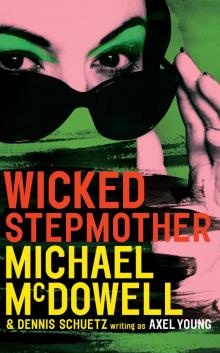 Wicked Stepmother
Wicked Stepmother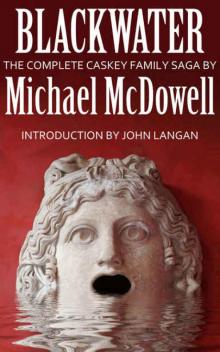 Blackwater: The Complete Caskey Family Saga
Blackwater: The Complete Caskey Family Saga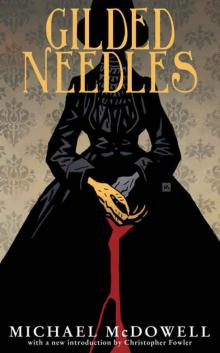 Gilded Needles (Valancourt 20th Century Classics)
Gilded Needles (Valancourt 20th Century Classics)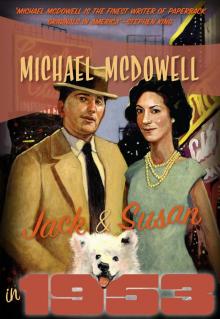 Jack and Susan in 1953
Jack and Susan in 1953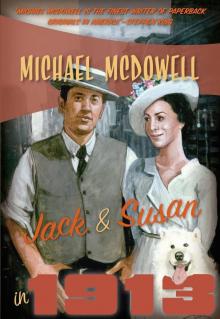 Jack and Susan in 1913
Jack and Susan in 1913 Rain
Rain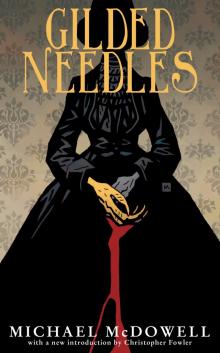 Gilded Needles
Gilded Needles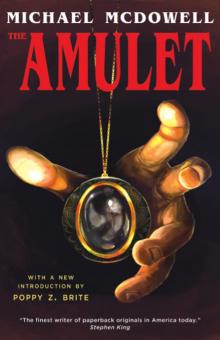 The Amulet
The Amulet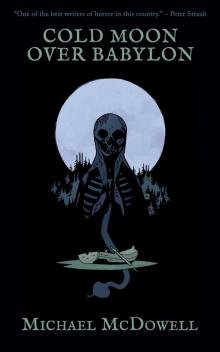 Cold moon over Babylon
Cold moon over Babylon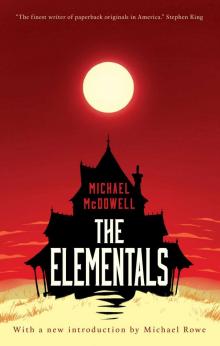 The Elementals
The Elementals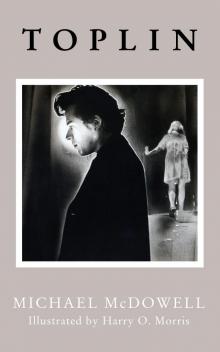 Toplin
Toplin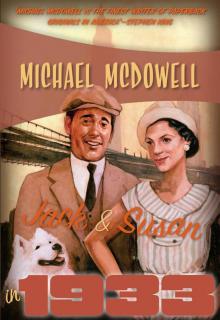 Jack and Susan in 1933
Jack and Susan in 1933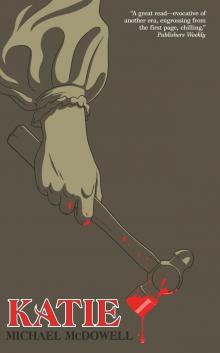 Katie
Katie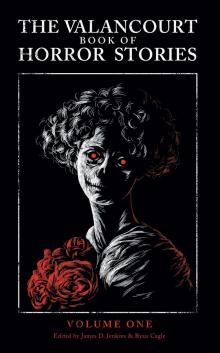 The Valancourt Book of Horror Stories
The Valancourt Book of Horror Stories